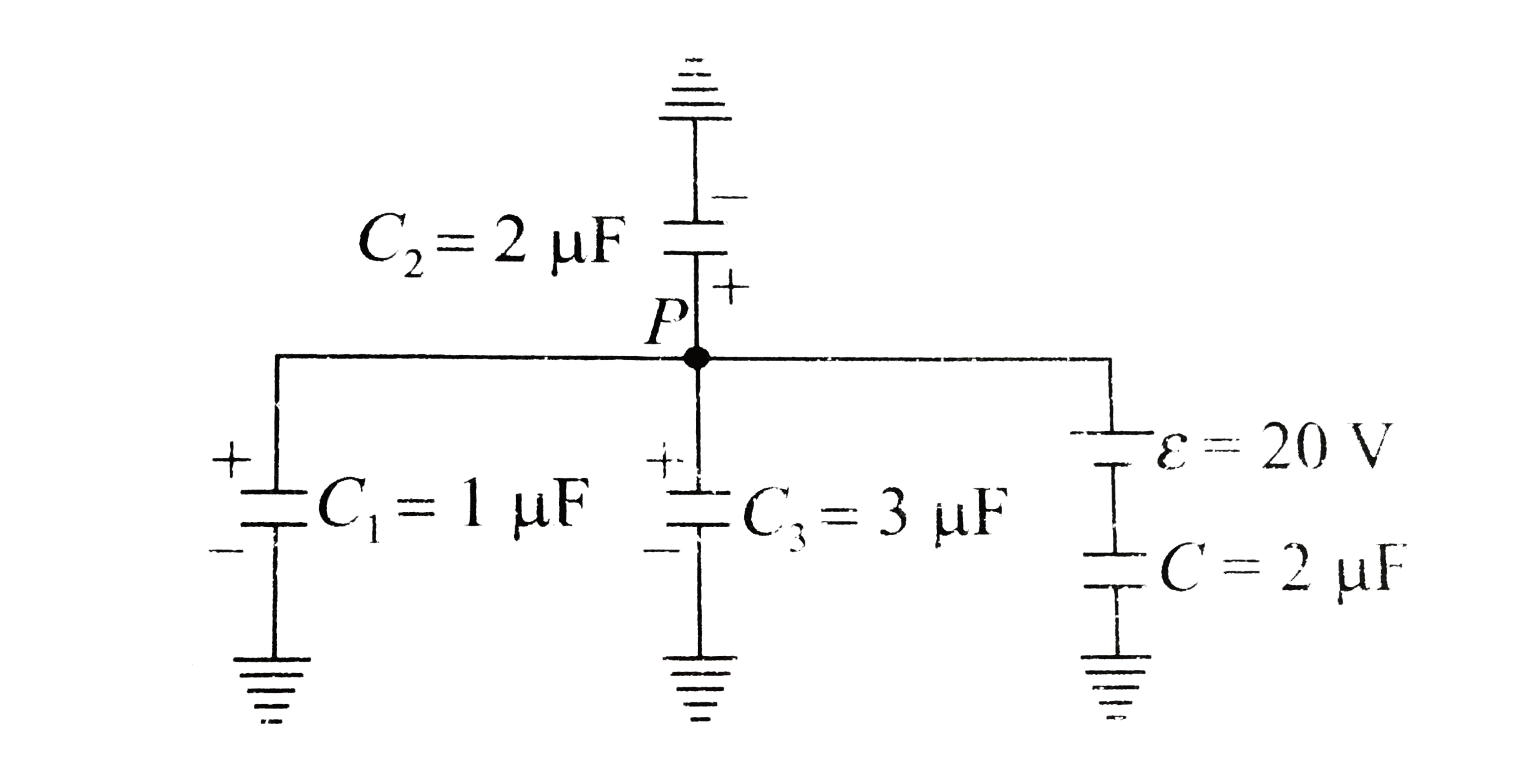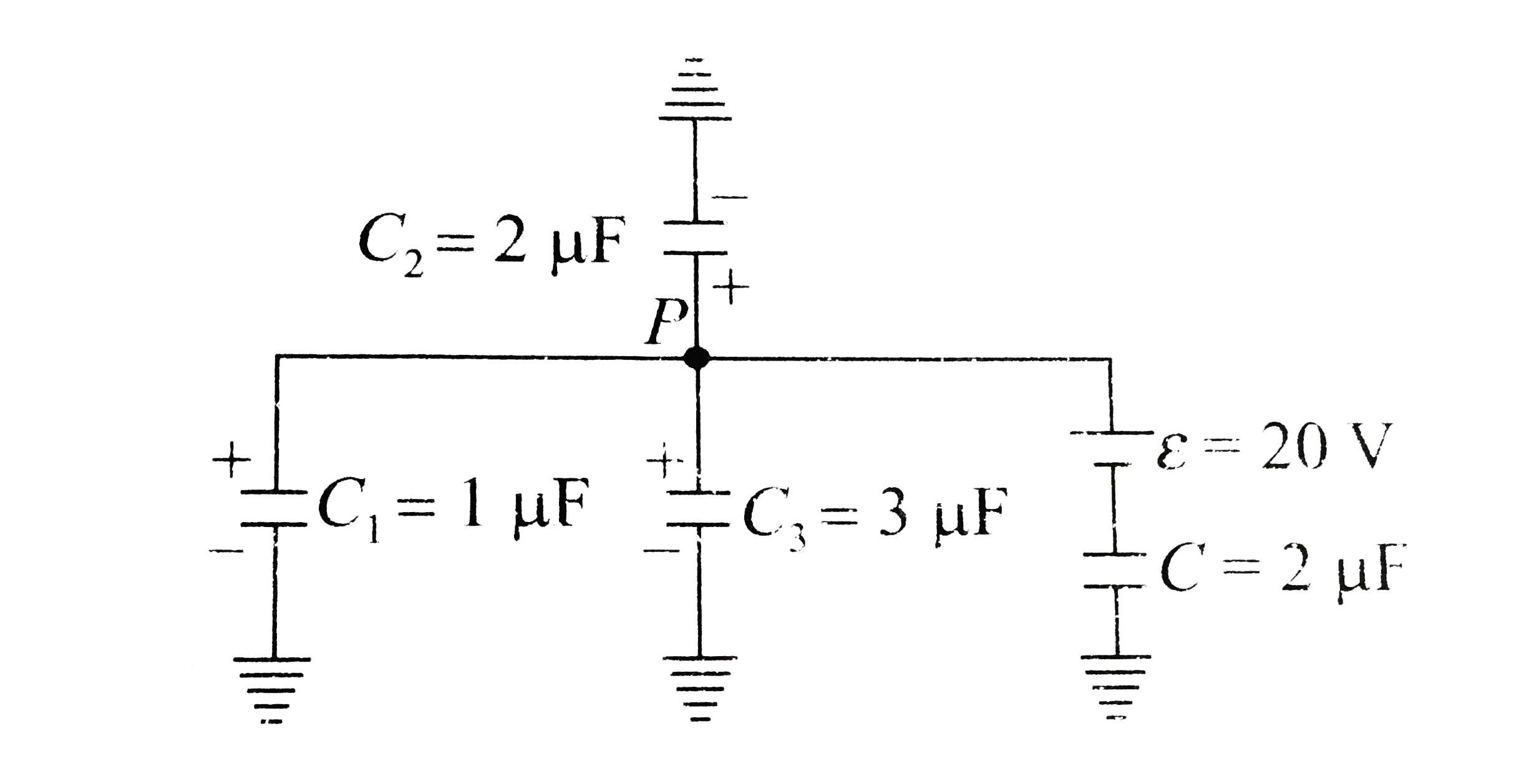Capacitor of capacitance 1 and capacitor of capacitance 2 are separetely charged fully by a common battery.The two capacitors are then separately allowed to discharged thgrough eual resistores at time t=0
The current in each of the two discharging circuits is zero at t = 0.
The currents in the two discharging circuits at t=0 are equal but not zero.
The currents in the two discharging circuits at t = 0 are unequal .
Capacitor losses 50% of its initial charge sooner than loses 50% of its initial charge.
The correct Answer is:B, D
b.,d.
During the decay of charge in RC circuit , , where
Since potential difference between the plates is initially the same, I is the same in both the cases at t = 0 and is equal to
When

or
Therefore, time taken for the first capacitor for
discharging of initial charge will be less.
Topper's Solved these Questions
- MISCELLANEOUS VOLUME 3Book:CENGAGE PHYSICS ENGLISHChapter:MISCELLANEOUS VOLUME 3Exercise:Assertion and Reason
Explore 8 Videos
- MISCELLANEOUS VOLUME 3Book:CENGAGE PHYSICS ENGLISHChapter:MISCELLANEOUS VOLUME 3Exercise:Integer Answer Type
Explore 11 Videos
- MISCELLANEOUS VOLUME 3Book:CENGAGE PHYSICS ENGLISHChapter:MISCELLANEOUS VOLUME 3Exercise:Assertion-Reasoning Type
Explore 1 Video
- MAGNETIC FIELD AND MAGNETIC FORCESBook:CENGAGE PHYSICS ENGLISHChapter:MAGNETIC FIELD AND MAGNETIC FORCESExercise:Multiple Correct Answer type
Explore 2 Videos
- MISCELLANEOUS VOLUME 5Book:CENGAGE PHYSICS ENGLISHChapter:MISCELLANEOUS VOLUME 5Exercise:Integer
Explore 12 Videos
Similar Questions
A capacitor C1 of capacitance 1μF and a capacitor C2 of capacitance 2μF are separately charged by a common battery for a long time. The two capacitors are then separately discharged through equal resistors. Both the discharge circuits are connected at t=0.
View SolutionA capacitor C1 of capacitance 1μF and a capacitor C2 of capacitance 2μF are separately charged by a common battery for a long time. The two capacitors are then separately discharged through equal resistors. Both the discharge circuits are connected at t=0.
View SolutionA capacitor of capacitance 100(μ)F is connected across a battery of emf6.0V through a resistance of 20k(Ω)for 4.0s after the battery is disconnecting?
View SolutionCapacitors C1=1μF and C2=2μF are separately charged from the same battery. They are allowed to discharge separately through equal resistors
View SolutionA capacitor A of capacitance 4μF is charged to 30V and another capacitor B of capacitance 2μF is charged to 15V. Now, the positive plate of A is connected to the negative plate of B and negative plate of A to the positive plate of B. find the final charge of each capacitor and loss of electrostatic energy in the process.
View SolutionTwo capacitors C1andC2(C1>C2) are charged separtately to same potential. Now they are allowed to discharge through similar resistors. Initial rate of discharging will be
View SolutionSix identical capacitors each of capacitance 2μF are connected as shown below. The equivalent capacitance between the points A and B is
View SolutionThe charge on the capacitor of capacitance 10μF in steady state condition in the circuit shown is
_PHY_E05_271_Q01.png)
View SolutionThree capacitors C1,C2,andC3 of capacitance 1μF,2μF,and3μF, respectively, are charged separately as shown in the figure. Now these charged capacitors are connected to a battery of ε=20V and an uncharged capacitor of C=2μF as shown in figure.
 ,
, 
The charge on capacitor marked C is
View SolutionThree capacitors C1,C2,andC3 of capacitance 1μF,2μF,and3μF, respectively, are charged separately as shown in the figure. Now these charged capacitors are connected to a battery of ε=20V and an uncharged capacitor of C=2μF as shown in figure.
 ,
, 
The potential of point P is
View Solution
